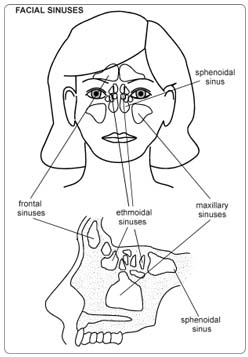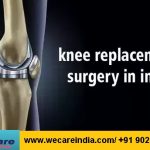What Is Maxillary Antral Sinus Washout?
Maxillary antral sinus washout clears the maxillary sinus of infectious drainage. The washout is typically reserved for patients with recurring sinus infections who cannot rid these complications with antibiotics or sprays. The drainage fills or blocks the maxillary sinus cavity causing cheek or tooth pain. In these cases, the sinus cannot clear the drainage itself and requires medical intervention.

During sinus washout, the doctor administers general anesthesia putting the patient to sleep. Using a metal tube inserted through the nose into the sinus, the doctor flushes the cavity with a saline solution, clearing the blockage. During the procedure, the doctor also collects a sample of the infected drainage to better understand the cause and nature of the condition. Sinus washout is an outpatient procedure with an average 3 to 4-hour recovery time before release. After surgery, patients typically feel slight pain in their noses, for which the doctor may prescribe pain medication. The doctor may also prescribe antibiotics to reduce risk of infection as the sinus area heals.
Smokers and obese patients may not be good candidates for sinus washout. Likewise, patients with high blood pressure should check with the doctor before pursuing the procedure. Patients with colds must get over the cold first, as the anesthesia may temporarily weaken their immune systems, worsening the infection. Moreover, patients should wait 1 to 3 months after the sinus washout before engaging in activities that may drastically alter sinus pressure (swimming, diving, or airplane travel)
Classification
By location There are several paired paranasal sinuses, including the frontal, ethmoid, maxillary and sphenoid sinuses. The ethmoid sinuses can also be further broken down into anterior and posterior, the division of which is defined as the basal lamella of the middle turbinate. In addition to the acuity of disease, discussed below, sinusitis can be classified by the sinus cavity which it affects:
- Maxillary Sinusitis – can cause pain or pressure in the maxillary (cheek) area (e.g., toothache, headache)
- Frontal Sinusitis – can cause pain or pressure in the frontal sinus cavity (located behind/above eyes), headache
- Ethmoid Sinusitis – can cause pain or pressure pain between and/or behind eyes, headache
- Sphenoid Sinusitis – can cause pain or pressure behind the eyes, but often refers to the vertex of the head
What Are These Nos ?
Recent theories of sinusitis indicate that it often occurs as part of a spectrum of diseases that affect the respiratory tract (i.e. – the “one airway” theory) and is often linked to asthma. All forms of sinusitis may either result in, or be a part of, a generalized inflammation of the airway so other airway symptoms such as cough may be associated with it.
Before The Operation
Sort out any tablets, medicines, inhalers that your Keep in their original boxes and packets. Bring them to the hospital with you. On the ward, your child may be checked for past illnesses and may have special tests to make sure that he or she is well prepared and can have the operation as safely as possible. Please tell the doctors and nurses of any allergies to tablets, medicines or dressings. You will have the operation explained to you and will be asked to fill in an operation consent form. Many hospitals now run special preadmission clinics, where you and your child visit for an hour or two, a week or so before the operation for these checks. If your child has a cold in the week before his or her admission to the hospital, please telephone the ward and let the ward sister know. Usually the operation will be put off. Your child is given time to get better before sending for him or her again. Your child needs to get over the cold before the operation can be done because by having an anaesthetic the cold could turn into a serious infection in the chest.
The Operation
You will have a general anaesthetic and be completely asleep.
A fine metal tube will be pushed into the nose and through the thin bone of the maxilla into the sinus. Salty water will be flushed through the tube into the sinus.
The salty water will come out of the little drain hole in the sinus, and drain into the nose. Any pus or infected fluid will come out as well.
A specimen of the infected fluid will be taken so that it can be examined so that the bugs causing the infection can be identified and then the rest washed away. The metal tube will then be taken out. The inside of the nose usually heals very quickly. There is no need for any stitches.
If the little hole in the sinus is blocked by infection, or if the infection is very bad, the surgeon will make a bigger hole into the sinus to help drain the infection away.
Because you are asleep, you will not feel any pain at all during the operation. Your operation can be done as a day case. This means that you come into hospital on the day of your operation, and go home the same day.
If the effect of the anaesthetic is not going away quickly and you feel drowsy or sleepy, you might need to stay in the hospital for one night and go home the day after the operation.
After – At Home
After three to four hours on the ward, your child should feel fit enough to go home. Before you leave, the nurses will check that your child’s nose is comfortable and is not bleeding. If your child has been given antibiotics, you will be told how often to take the medicine, and how many days you will need to use it. If your child has been given nasal drops, you will be told how to use the drops, and for how long. Use paracetamol suspension every six hours to control any discomfort in the nose. Follow the instructions you were given on the ward carefully. Do not let your child blow his or her nose for the first 48 hours after the operation. Your child should take it easy for the rest of the day. Do not let your child do anything too energetic in case this starts a nosebleed. Your child should be able to go back to school after two days. Your child should not go swimming or diving until the nose has healed, usually after about two weeks.
Possible Complications
As with any operation under general anaesthetic, there is a very small risk of complications related to your heart and the lungs.
The tests that you will have before the operation will make sure that you can have the operation in the safest possible way and will bring the risk for such complications very close to zero.
If you follow the advice given above, you are unlikely to have any problems :
There is a small risk that the nose may bleed when you get home. If this is just a spot or two you should not worry. If the nose continues to bleed for more than an hour, come back to the ward.
There is a small risk of infection at the area of the operation. If you develop increasing pain in the cheek bone or the nose, a headache or a temperature, it probably means that an infection is developing and you will need medical attention promptly. Taking antibiotics for a week or two usually solves the problem.
Very rarely, the infection can be serious and can spread around the area of the operation or in your bloodstream. If this happens, you will need to come back to hospital and have it treated with intravenous antibiotics – through a small plastic tube placed in a vein in your arm.














